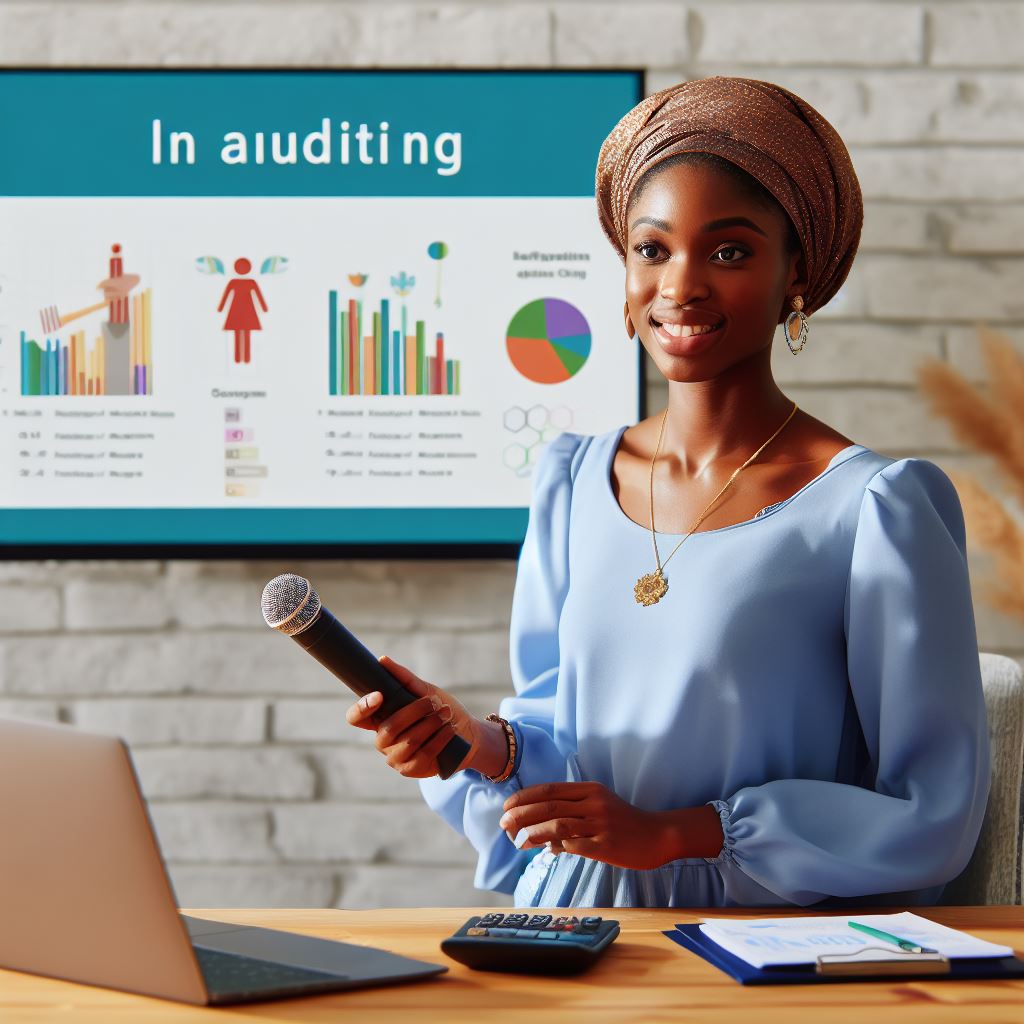Introduction
Auditing clerk roles involve tasks such as reviewing financial documents and ensuring accuracy.
Gender and diversity in the workplace are crucial for equal opportunities and different perspectives.
Studying gender and diversity in auditing clerk roles in Nigeria is important for understanding representation and inclusivity.
Gender and Diversity in Auditing Clerk Roles
A. Overview of gender distribution in auditing clerk roles in Nigeria
- There are significant differences in the number of male and female auditing clerks in Nigeria.
- Statistics indicate that there is a gender gap, with more males than females in auditing clerk positions.
- Possible factors contributing to the gender gap include societal norms and stereotypes surrounding gender roles.
B. Importance of promoting gender equality in auditing clerk roles
- Having a gender-balanced workforce in auditing clerk roles provides numerous benefits for organizations.
- Diverse teams bring a variety of perspectives, leading to more innovative solutions.
- Gender equality in the workplace fosters a more inclusive and supportive environment for all employees.
- Addressing stereotypes and biases that exist in auditing clerk roles is crucial for promoting equality.
- Workplaces free of biases contribute to increased employee satisfaction, productivity, and overall organizational success.
Read: Gender Perspectives in Administrative Assistant Roles
Challenges Faced by Female Auditing Clerks in Nigeria
Gender inequality and diversity issues persist in the auditing clerk roles in Nigeria, leading to various challenges for female professionals in the field.
These challenges can be categorized into gender-based obstacles in the workplace and socio-cultural factors affecting female auditing clerks.
A. Gender-based obstacles in the workplace
One significant challenge faced by female auditing clerks in Nigeria is the limited career advancement opportunities available to them.
Despite their qualifications and skills, women often face barriers that hinder their progression within the profession.
This can be attributed to gender biases and stereotypes that perpetuate the belief that certain roles or positions are best suited for men.
In addition to limited career advancement opportunities, female auditing clerks also experience gender pay gap and income disparities.
They often earn less than their male counterparts for performing the same job.
This pay gap not only affects their financial well-being but also leads to feelings of inequality and demotivation in the workplace.
B. Socio-cultural factors affecting female auditing clerks
Socio-cultural factors play a significant role in the challenges faced by female auditing clerks in Nigeria.
Traditional roles and societal expectations, influenced by cultural norms, often place limitations on the progress of women in auditing clerk roles.
These expectations dictate that women should prioritize domestic responsibilities over their careers, hindering their professional growth.
Another socio-cultural factor affecting female auditing clerks is the conflict between family responsibilities and work-life balance.
Women in Nigeria are often burdened with multiple responsibilities, including caring for children, managing household chores, and supporting their families.
Balancing these demands with the demands of their auditing clerk roles can be overwhelming, leading to stress, burnout, and a lack of career fulfillment.
In fact, female auditing clerks in Nigeria face significant challenges due to gender-based obstacles in the workplace and socio-cultural factors.
Breaking down gender biases, providing equal career opportunities, addressing the gender pay gap, and fostering a supportive work environment are essential steps towards creating a more inclusive and diverse auditing profession in Nigeria.
Read: Remote Work Opportunities for Administrative Assistants
Strategies for Promoting Gender and Diversity in Auditing Clerk Roles
A. Encouraging equal opportunities and fair recruitment practices
Creating an inclusive and diverse workplace starts with promoting equal opportunities and fair recruitment practices.
This involves eliminating gender-biased job descriptions and requirements that may discourage certain individuals from applying.
By doing so, companies can attract a wider pool of candidates, increasing diversity in auditing clerk roles.
It is crucial to review job descriptions to ensure they are written in a neutral and inclusive manner.
Gender-specific language or requirements that may favor a particular gender should be removed.
By focusing on the skills, qualifications, and experiences necessary for the role instead, companies can ensure that the hiring process is fair and unbiased.
In addition to addressing job descriptions, companies should implement diversity-focused hiring
This can include actively seeking out candidates from underrepresented groups, such as women.
By reaching out to diverse networks, attending job fairs targeted towards women, or partnering with organizations that support diversity in the workplace, companies can increase their chances of attracting qualified female candidates.
B. Providing support and mentorship programs for female auditing clerks
Support and mentorship programs play a crucial role in promoting gender and diversity in auditing clerk roles.
These programs provide guidance, encouragement, and opportunities for professional growth for female employees in the field.
Enabling career development and progression is essential in creating an inclusive environment.
Companies can achieve this by offering training programs, workshops, and certifications specifically designed to enhance the skills and knowledge of female auditing clerks.
These initiatives not only help individuals become better at their jobs but also increase their chances of career advancement within the organization.
Mentorship programs can also be beneficial in fostering gender and diversity in auditing clerk roles.
Pairing female auditing clerks with experienced mentors from senior positions can provide guidance, support, and valuable insights.
Mentors can share their own experiences, offer advice, and help female auditing clerks build confidence in their abilities.
This mentorship can significantly contribute to the professional development and success of female employees in the field.
In short, promoting gender and diversity in auditing clerk roles in Nigeria requires the implementation of various strategies.
Companies should focus on encouraging equal opportunities and fair recruitment practices by eliminating gender-biased job descriptions and implementing diversity-focused hiring strategies.
Additionally, providing support and mentorship programs for female auditing clerks is crucial in enabling career development, enhancing skills, knowledge, and confidence.
By implementing these strategies, companies can create a more inclusive and diverse workplace in the auditing industry.
Read: Ethics and Conduct for Administrative Assistants in Nigeria

Case Studies of Successful Gender Inclusion Initiatives
In this section, we will explore case studies of successful gender inclusion initiatives in auditing clerk roles in Nigeria.
These organizations have implemented various programs and initiatives to promote gender diversity and inclusion in the workplace, resulting in positive outcomes and impacts on workplace dynamics.
A. Organizations promoting gender diversity in auditing clerk roles
1. Overview of initiatives and programs implemented
Women in Audit, Nigeria (WIAN), a leading auditing firm in Nigeria, has implemented several initiatives to promote gender diversity in auditing clerk roles.
They have established a dedicated gender inclusion committee that focuses on developing and implementing policies and programs to ensure equal opportunities for men and women in the workplace.
One of their main initiatives includes targeted recruitment efforts aimed at attracting more female candidates for auditing clerk positions.
They have partnered with educational institutions and professional organizations to actively promote auditing as a career choice for young women.
Additionally, they have implemented mentoring and training programs specifically designed for female auditors, providing them with the necessary skills and support to succeed in their roles.
2. Positive outcomes and impacts on workplace dynamics
The initiatives implemented by Women in Audit, Nigeria (WIAN) have had significant positive outcomes and impacts on workplace dynamics.
Firstly, the gender balance in auditing clerk roles has improved significantly, with a higher percentage of female auditors being hired and promoted.
This has created a more inclusive and diverse work environment, where different perspectives and ideas are valued.
Furthermore, these initiatives have led to increased employee satisfaction and retention rates.
Female auditors feel more supported and empowered, leading to improved job satisfaction and motivation.
This, in turn, has positively affected overall team dynamics, collaboration, and productivity.
B. Lessons learned and best practices for fostering gender and diversity inclusion
1. Collaboration with stakeholders and industry partners
One of the key lessons learned from these case studies is the importance of collaboration with stakeholders and industry partners.
Organizations that actively engage with educational institutions, professional organizations, and other relevant stakeholders can effectively promote gender diversity and inclusion in auditing clerk roles.
By working together, they can address barriers and create opportunities for women to succeed in this field.
2. Continuous monitoring and evaluation of initiatives
Another crucial lesson learned is the need for continuous monitoring and evaluation of gender inclusion initiatives.
Organizations must regularly assess the effectiveness of their programs, identify any potential gaps or challenges, and make necessary adjustments.
This ensures that initiatives remain relevant and impactful, and that targeted outcomes are achieved.
In review, these case studies demonstrate the success of organizations in promoting gender diversity and inclusion in auditing clerk roles in Nigeria.
Through targeted initiatives, collaboration with stakeholders, and continuous monitoring, these organizations have created more inclusive and diverse workplaces, with positive outcomes and impacts on workplace dynamics.
It is essential for organizations across the country to learn from these examples and strive for gender equality and diversity in their own auditing clerk roles.
Read: How to Become a Certified Bookkeeper in Nigeria
Conclusion
A. Summary of key points discussed
In this section, we have explored the topic of gender and diversity in auditing clerk roles in Nigeria.
We discussed the current state of gender representation in the field and highlighted the importance of diversity for organizations.
We also examined the challenges faced by women in the auditing clerk profession, such as gender stereotypes, bias, and lack of opportunities for career advancement.
It is crucial to address these issues and create a more inclusive and equitable workplace.
Furthermore, we explored the benefits of having gender and diversity in auditing clerk roles.
Studies have shown that diverse teams lead to enhanced decision-making, increased creativity, and better financial performance.
B. Final thoughts on the importance of gender and diversity in auditing clerk roles in Nigeria
Gender and diversity are not just buzzwords; they are essential elements for the growth and success of any organization.
By promoting gender equality and diversity in auditing clerk roles, organizations can tap into a wider talent pool and enhance their overall performance.
Women should be encouraged and provided with equal opportunities to pursue careers in auditing.
This can be achieved through mentorship programs, training, and creating a supportive work environment that values diversity.
Organizations must also establish clear policies and practices to eliminate gender bias and ensure equal opportunities for all employees.
C. Call to action for organizations and individuals to promote gender equality in the workplace
We call upon organizations in Nigeria to recognize the importance of gender equality and diversity in auditing clerk roles.
They should strive to create inclusive workplaces that provide equal opportunities for both men and women.
Individuals can also play a crucial role in promoting gender equality.
By supporting and advocating for women in the workplace, challenging stereotypes, and valuing diversity, we can contribute to a more balanced and equitable society.
Together, let us work towards creating a workplace where gender and diversity are celebrated, enabling auditing clerk roles in Nigeria to thrive and contribute to the country’s economic growth.




